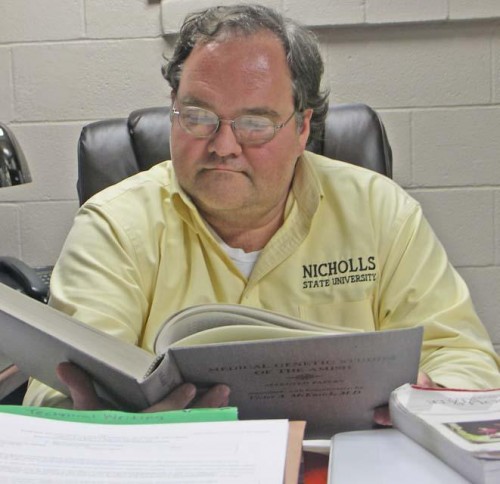17-year-old dies in crash
October 26, 2010Graduated driver licensing: What’s it all about?
October 28, 2010John Doucet is a realistic man. A first meeting of this Nicholls State University scientist will not find him in a stereotypical white lab coat, surrounded by microscopes, glass test tubes or unusual specimens.
Neither is this college professor the kind to be found in a plush, oak-paneled study sporting a tweed jacket with leather patches on the elbows.
No, Doucet is more distinguished than that – in a realistic way.
Part of reality for this seventh-generation Acadian native of Lafourche Parish can be found in the focus of his work, which is distinguishable to the people of southern Louisiana.
His most recent element of distinction – one he just grinned and shrugged about when asked – is his being designated as the first advanced certified public health geneticist in the state. That honor came as he completed a specialized program through Sarah Lawrence College in Bronxville, N.Y.
“There are only 30 people [in the nation] that have this advanced certification,” said Rachel Grob, associate dean of graduate studies for Sarah Lawrence College. “What John earned was a post graduate advanced certification, which specifically equips him to work that juncture between public health and genetics.”
“I don’t know a whole lot about what he does. I just know he has always been involved in it and that he has always taken an interest in this area of genetics that nobody has,” said Dr. Allayne “Laynie” Barrilleaux, vice president of academic affairs for Nicholls State University, who spoke favorably of Doucet.
Doucet chuckled when asked exactly what it is he does and how he became involved in an area of genetic research that has only gained significant recognition during the past decade. “Actually I was in the right place at the right time,” he said.
Doucet explained that while working on his doctorate, he began looking into stories of Acadians inflicted with Usher syndrome, an unusual genetic ailment, which causes both blindness and deafness in an individual and which is common to that segment of the population.
This drew Doucet’s interest because the risk of it involved a group of people he knew as family and friends. From there his involvement in genetic research expanded beyond the lab and into practical application.
“I worked with the LSU Medical Center for many years on a website called Genetics and Louisiana Families. Then I took a lecture tour to support that website. When [educators at Sarah Lawrence College saw what was being done] they said, ‘We need this guy in our program for his own sake, but also as an example for other students to see what can be done and what kind of commitment is required,'” Doucet said.
“I was at a genetics meeting in Philadelphia and [Sarah Lawrence College] had a booth there. So I picked up an application and applied. And they accepted me,” he explained.
While he did have a self-structured background and interest in public health genetics, it was not until completing his course of study with Sarah Lawrence College that Doucet could claim the designation as being professionally certified in this field from the nation’s only institution that provides this academic recognition.
While the study of human genetics in general can seem impersonal and unusual at times, Doucet explained that in the case of public health genetics, the focus shifts from rare, single-gene disorders to circumstances common to population groups and involve multiple conditions with a greater degree of gene-to-gene interaction.
“Normally, a patient goes to the doctor to be treated [for a specific ailment], but the doctor doesn’t look beyond a single patient or the patient’s immediate family,” he said. “A public health geneticist can help by examining an entire population pool.”
The research of the public health geneticist looks at the rate of disease or common disabilities among a given population group. From there steps, could be taken to ultimately treat or even possibly prevent such ailments from occurring. The public health geneticist will look at not only environmental elements, but at the biology involved.
Doucet confirmed that it is a matter of translating the theory of science into practical application.
In the case of Usher syndrome, it was not until late in the 20th century when scientists recognized that isolated Acadian populations shared a common threat of experiencing both hearing disorders and visual impairments among individuals. Many people with Usher syndromes also have severe difficulty with balance.
Researchers know that Usher syndrome is inherited as an autosomal recessive trait. Simply put, this means that both males and females can have the generic disorder and pass it along to their children.
Symptoms of Usher syndrome can be seen at birth or progress over time. As with most conditions, early detection can help because the individual can begin learning how to live with the disability. High doses of vitamin A palmitate might slow the progression of the disorder, according to some researchers, but overall there is no cure for Usher syndrome.
This is why Doucet finds his work important – in hopes of someday having fewer people impacted by this or other ailments. It is the work of a public health geneticist that takes research out of the lab and to the populations that need it the most.
“[Doucet] is showing an example of the type of research that can be done in a regional area with regional needs,” Barrilleaux said. “Because of the makeup or our demographics and the things we are exposed to, he looks into that in our area. Who else is going to do that?”
The Nicholls professor said he likes being able to work at a regional institution which is small enough to focus in local needs and make a difference. “It’s much more meaningful if I can address this and other issues,” he said.
As the state of Louisiana’s first certified public health geneticist Dr. John Doucet of Nicholls State University is conducting research into ailments common to Acadian people. MIKE NIXON










